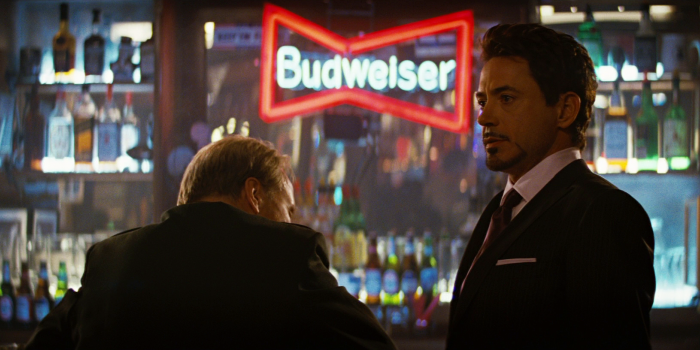
Editor’s Notes: Porch Stories is currently playing in Toronto at TIFF Bell Lightbox. For more of the film, read Matthew’s review.
Matthew Blevins: Hello Sarah, it’s a pleasure to talk to you. How are things up in Ontario?
Sarah Goodman: Not bad, I’m actually in a car with my partner and we’re driving to a cottage. That’s a very typical Ontario thing to do, go to a cottage in the summer. I’m pretty happy about that.
Matthew Blevins: This being your first foray into narrative dramatic filmmaking, how did the documentary methods you’ve used in the past inform your process in the making of Porch Stories
Sarah Goodman: I think observation is a big part of any work I do. My documentaries were very observational, they were very scene based. I constructed them kind of like narratives and I’ve always been interested in the way the two forms kind of interplay but they were always rooted in observation and how you can learn a lot about people by observing them. So I think I brought that over into fictional filmmaking. I don’t like to hit people over the head with ideas so I feel like the way the story sort of unfolds in Porch Stories and the way I convey the neighborhood is from that observational lens. Another way it informed me was just practically speaking. In a documentary you’re used to a very small crew and you’re used to having to think in the moment and improvise and problem solve if things don’t go quite right you always have to keep going in documentaries and for me in fiction and working with a micro budget and having having a pretty small crew felt pretty natural to me and having to deal with problems that came up just by virtue of being low budget, having to problem solve. I’m used to that so that wasn’t too difficult for me.
Matthew Blevins: The use of non-professional actors has a pretty deep history in cinema and filmmakers like Cassavetes using more naturalistic performances and typically capturing a more accurate representation of how people actually talk and interact with one another, what was it like working with these two great musicians as the leads of your film?
Sarah Goodman: Once I had cast Laura and Jose I made the characters for them. They hadn’t previously been musicians so I increased the musical content in the film and I made some other adjustments so the characters were actually like close to the real life people. Not in terms of the dilemmas they were going through necessarily, but they didn’t have a huge distance to jump. I really enjoyed working with them because it was my first time doing a fictional feature so it was like we were all in it together, it was the first time for all of us so we were just kind of figuring it out as we went. I think because I’m used to documentaries where even though you’re not directing the people in your documentary to do stuff, you’re creating an environment where they can feel safe. I feel like a director, especially in a verite documentary setting is creating an environment where they can be themselves and that’s a lot of what I was doing in Porch Stories as well, making them feel comfortable and setting up the parameters of the scene in a way that they could see themselves and rely on that naturalism to carry the scene. I really enjoyed it. I do look forward to working with professional actors as well because that would be a joy as well in art and they would be able to bring a whole different skill set. That’s what I hope to do with my next film. This was a really unique experience and it was a very group experience because we were all in it together.
Matthew Blevins: I think it’s fantastic that the evolution of the film was based around the strong suits of the two performers. I think the score that they provided gave the film a tremendous personality. It underscored her dilemma in choosing between the conventions of adulthood that we are told we are supposed to adhere to and the allure of youth and romance and the world that she left behind. So that became a large part of the personality of the film.
Sarah Goodman: Oh cool! Yeah, that’s great! Both Laura and Jose wrote the score to the film and was obviously kind of a natural extension of their roles in the film and in helping create the music and really the fabric of the soundscape of the film. I’ve always hung around musicians so it felt very natural to me to make the characters musicians.
Matthew Blevins: What I also loved about the film was the natural dialogue of the passers by and catching the snippets of what their conversations were. There were some eye rolling moments but there seemed to be an affection and a self deprecation for our generation in those little passing moments.
Sarah Goodman: Absolutely, it is pretty affectionate but that was actually the impetus for the film. Me sitting on my porch which I would often do as I was writing on my computer, sort of half listening to what was going on around me and I sort of eavesdropping a lot on people’s conversations. Not just on my porch but everywhere I went, and I think I’ve always been interested in the rhythms of the way people talk and what it expresses, not just words themselves but the milleau of the world we live in. There is a particular milleau in that neighborhood in Toronto of hipsters and the young generation and the Portuguese folks in contrast to that. That’s like a character in and of itself for me that I really wanted to capture. Some of those conversations are actually verbatim conversations that I heard and other ones are improvised with friends, but it was kind of uncanny how I was able to get those improvisations out of people once I gave them the frame because I think I’m capturing something that exists in this generation.
Matthew Blevins: It’s extremely topical and I don’t know if beard conditioners will be topical ten years from now but it’s a great snapshot of a time and culture.
Sarah Goodman: Yeah, and we’re just trying to be slightly critical in the sense that the neighborhood is changing and the Portuguese folks comment on that and the feeling that the people that are moving in are kind of taking over. The neighborhood is changing really rapidly and the Portuguese folks, a lot of them are still there and to look at that and capture it because it will shift.
Matthew Blevins: So this is a reflection of a real neighborhood dynamic somewhere in Toronto?
Sarah Goodman: Yes, and even though it’s very specific and a real thing that’s happening in most major cities in North America, gentrification, but it’s a very specific neighborhood that anyone in Toronto when they see the film will know where that is on the west end of Toronto where a lot of Portuguese families settled around the 50s and bought houses when they were really cheap, largely working class people and now just in the last ten or fifteen years the market value in those neighborhoods has gone way up and it’s become more and more gentrified. The younger Portuguese will typically move somewhere else but their parents remain there, there are still younger folks there too, but yeah, it’s a really specific neighborhood. There’s a specific aspect and a universal aspect to it.
Matthew Blevins: I think it shows with each of the sets of couples at different crossroads of love and its many different forms, but the thing is even at the kindling romance between the teenage girl and the gamer philosopher or the older couple or Laura making the decision to move onto this new phase of adulthood or to keep pursuing the old dreams that she obviously hasn’t put away completely, what I wonder is if we ever get it figured out.
Sarah Goodman: I guess that’s kind of the underlying question because at the end the older woman is questioning her whole life. Her husband has just said he wanted a divorce, obviously they have been married for fifty years so I imagine she’s questioning her choice that she made so long ago. So the different generations of women are all reflecting on that. For Brianna, the young woman, still a teenager basically, she makes her decisions impulsively and light-heartedly and they don’t seem to have much have much implications. She’s not so concerned and I think that often that is the case when you’re younger and I think that when you get older these decisions about who your partner is going to be become more weighty. I tried to look that that, how women and indecision and the effects of that indecision and as young person it’s not that serious, but it becomes more of a burden. I guess the fact is who knows if we ever really get it figured out. Relationships or who we should be with.
Matthew Blevins: For the women in your film it seemed like those decisions had a major impact on their sense of identity. Do you think that’s still the case for women, the path they choose has a major influence on their sense of identity?
Sarah Goodman: Yeah, and I think women, because of the institution of marriage for hundreds of years have been conditioned to support their spouse and play second fiddle. I think that socialization remains even though things have changed a lot and I think it’s true that women in some ways still feel they need to change themselves to make things work in a relationship. I think for both women and men can both feel like we changed depending on who we’re with and it brings out different parts of who we are. You definitely feel like for Laura’s character that she’s more conservative when she’s with this conservative guy she’s engaged to and has given up something that’s more a dream for her and that she’s somewhat different when she’s with Gabriel. I think that’s something everyone can relate to whether you’re a woman or a man I think it draws different things out. I think that women have a tendency to compensate in relationships to try and make them work. For me it feels like she’s at this quandary and what I feel like is that her character is actually single. When she’s sitting there at the end on the porch wondering what she’s going to do, in my mind she decides to be single and when she’s biking in the epilogue, I don’t want to say you can only be free if you’re single but in her eyes that’s what she needed to figure out who she was and what she wanted.
Matthew Blevins: We talked about the verite style of Cassavetes, but I found nuances of Jarmusch and Linklater, particularly in Slacker where he was following the 90s Austin youth and listening to their conversations, but who are your cinematic idols?
Sarah Goodman: Now that you just mentioned that I do really admire Linklater and I did really like Slacker and the way that seemingly random people in the film that are encountered really tell the story of a place just by the way that they talk and who they are, but I hadn’t really consciously thought of that as an influence but now that you’ve pointed it out I can really see that. When you mentioned Cassavetes, definitely Cassavetes is a big influence for me, because of his whole process and the tone of his films are much more fraught and in the way that Porch Stories is more of a mild film compared to that but I really was inspired by his shooting style and it was a very big deal when he shot Faces with a handheld camera in a verite style for a drama and that’s not as much a big deal any more but it was really inspiring for me to see how he conveyed a lot of emotions by the way he shot that film. The cinematography of that film was a big influence and just in using non-professional actors there’s a realness in that, that would also be an influence for sure. A lot of the filmmakers that I admire I couldn’t really trace them directly to Porch Stories but Kelly Reichart, I really love her films, and I think Fish Tank is something that influenced me quite a bit by Andrea Arnold but you couldn’t really see it in this film. I think that Slacker that you mentioned you can see the parallels there. The fact that you mentioned Jarmusch is hugely flattering, I love Jim Jarmusch. I think that Down By Law would probably be my favorite film of his.
Matthew Blevins: As far as being a more “mild” film, Porch Stories has a force to it. I’ve watched it twice in the last few weeks and there are moments that have stuck with me the entire time and I really enjoyed the film and I’m glad I had the opportunity to talk to you about the film.
Sarah Goodman: Well thanks so much Matt, I really enjoyed it!



